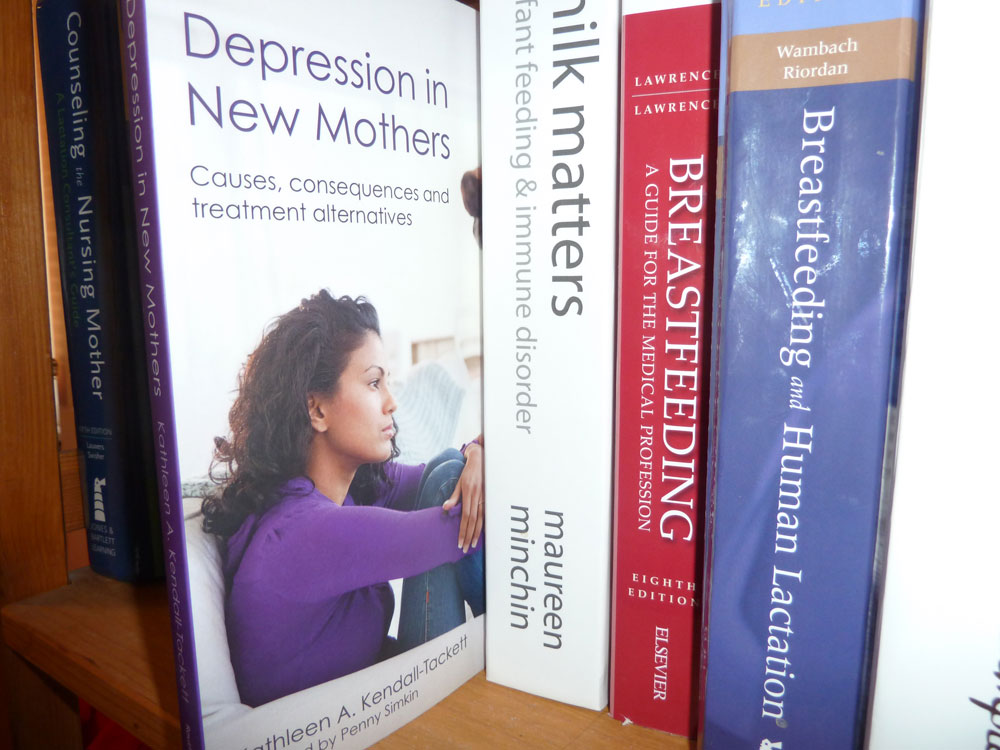Book review of Depression in New Mothers Causes, Consequences and Treatment Alternatives by Kathleen A. Kendall-Tackett, Routledge, 2017
Depression in New Mothers Causes, Consequences and Treatment Alternatives by Kathleen Kendall-Tackett is a very informative book for anyone who wants to know more about postnatal depression (PND). Whether you work with women or are interested for yourself or a family member, this little book has all the latest information in eighteen comprehensive, breastfeeding-friendly chapters. Mothers’ stories are interspersed with research and every chapter is well referenced to cover symptoms, diagnosis, risk factors and treatment options for depression. Although the research is heavy going at times those sections can always be skipped in favour of the short easy to read summaries.
Postnatal depression
With as many as 12-25% of new mothers having postnatal depression the author explains that PND can affect men and women from a range of backgrounds with rates as high as 40% in some high risk groups. And the book discusses how PND is often seen alongside anxiety, obsessive compulsive disorder, post traumatic stress disorder (PTSD), eating disorders, substance abuse and sometimes bipolar disorder. Kendall-Tackett explores the many risk factors for PND including pain, diet, lack of sleep, lack of exercise, psychosocial factors, stress and stressful events (encompassing birth trauma, partner violence, childhood abuse, and natural disasters), smoking, allergies, vitamin D deficiency and anything that makes changes to the gut microbiome. She discusses how new research has found that the immune system has been shown to control stress and depression by producing an exaggerated inflammatory response which disrupts the body’s regulation of mood, sleep and appetite.
Breastfeeding and postnatal depression
Importantly, Depression in New Mothers Causes makes connections with breastfeeding throughout its pages. Discover the research behind how:
- Breastfeeding reduces stress, turns off the body’s inflammatory response and helps protect the baby from the harmful effects of depression
- Breastfeeding problems increase the risks of depression and must therefore be dealt with promptly
- Depression increases the risk of stopping breastfeeding
- Breastfeeding mothers get more sleep (not less) than mothers who bottle feed formula
- Most treatments and antidepressants are compatible with breastfeeding
Despite the above facts the author discusses that many health professionals still urge stopping breastfeeding which can prevent women seeking and receiving help.
Effects of maternal depression on the baby
In chapter four we learn the ways that stress during pregnancy can affect the developing baby and how depression can affect babies’ emotions, stress levels, health, temperament, social development and mother infant bonding. These effects, explains Kendall-Tackett, reinforce the importance of treating maternal depression and its accompanying conditions promptly.
The strongest relationship between maternal cortisol and infant behavioural response was with maternal cortisol measured at 25 weeks gestation. The authors concluded that exposure to prenatal stress may have programmed infants with an exaggerated stress response.
Babies of depressed mothers had depressed affect and right frontal EEG [electroencephalograms] asymmetry as early as 3 months. Right frontal asymmetry is an abnormal pattern found in chronically depressed adults, and is a physiological marker of depression in babies.
Treatments for postnatal depression
The book comprehensively covers treatments compatible with breastfeeding. Subject areas covered include:
- Which screening tools and websites are recommended for PND and suicide risk and where to find them
- What to say to a mother who may be having thoughts about harming her baby and what questions to ask regarding PTSD and trauma
- How social support can help reduce the risks of PND
- Why treatments to lower inflammation can treat and prevent depression
- The success rate of alternative treatments including the value of exercise in reducing inflammation, having sufficient omega 3 fatty acids in the diet, the impact of vitamin D deficiency and more
- Bright light therapy, how it can be done, how it works, and safety concerns about homemade devices
- The use of St John’s wort including recommended doses and studies comparing it to prescription antidepressants sertraline and paroxetine
- A discussion of prescription antidepressants compatible with breastfeeding
- How interpersonal psychotherapy, and cognitive behavioural therapy can help treat and prevent depression
Summary
Depression in New Mothers Causes, Consequences and Treatment Alternatives (third edition) is a valuable book for anyone working with women in the perinatal period to help them recognise the risk factors for postnatal depression and when to refer mothers for help. It will also be useful to the medical profession to reassure them of the value of continuing to breastfeed for mother and child and to provide the research and references behind the compatibility of specific treatment options when a mother is pregnant or breastfeeding.
For more on this subject see Breastfeeding and Depression on this website.
